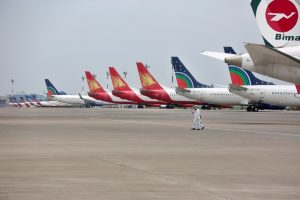Bangladesh’s ruling party is defying pressure to open talks with the opposition after its walkover win in an election marred by unprecedented bloodshed, boycotts and low turnout.
Despite warnings that Sunday’s crushing victory did not amount to a mandate, the ruling Awami League vowed to ‘eliminate militancy’ as the death toll from election day violence rose to 24.The main opposition Bangladesh Nationalist Party (BNP), which refused to field candidates in the election, ratcheted up the pressure on the government by extending a general strike until Wednesday.
Newspapers said the government was leading Bangladesh towards disaster but one of Prime Minister Sheikh Hasina’s top lieutenants ruled out early dialogue with the BNP to agree on a framework for a new vote.
‘We’re not thinking about talks right now,’ Environment Minister Hasan Mahmud told AFP.
‘Our top priority now is to form a government and contain violence. We have to eliminate violence and militancy to give the people a breather.’
The Awami League cruised to victory in Sunday’s election after the BNP and 20 other opposition parties refused to take part.
With all but a handful of seats still to be declared, the Awami League had won around 80 per cent of the 300 parliamentary seats with allies mopping up the rest.
But few were in a mood for celebrating after the carnage of election day when hundreds of polling stations were torched and at least 21 people killed, mostly by police who were the target of firebomb attacks.
Local newspapers called it the bloodiest election in Bangladeshi history and said the Awami League had won ‘a hollow victory which gives it neither a mandate nor an ethical standing to govern effectively’.
‘Yes, we can’t say it was a universally acceptable election,’ Communications Minister Obaidul Kader told AFP.
‘The festive atmosphere was absent and the turnout was ordinary… but you can’t say it is unacceptable.
‘Our next task is to form the government. We are ready to hold talks with the opposition to find a consensus, but first they have to eschew violence.’
The BNP’s leader Khaleda Zia has been under de facto house arrest for more than a week after mobilising supporters in a bid to derail the election.
Hasina, who first came to power in 1996 and then thrashed Zia in a 2008 comeback, has accused her arch rival of orchestrating the violence which reached a crescendo on Sunday.
The BNP in turn blames the government for the crisis after it refused demands for the election to be organised by a neutral caretaker administration as in previous years.
BNP vice president Shamsher Chowdhury said the low turnout showed the overwhelming desire for elections to be overseen by a neutral caretaker administration.
‘This government must declare this election null and void and we need a new election organised by a non-party government,’ he told AFP.
‘The government should not waste any more time.’
Western powers, including the US, refused to send observers although the State Department said it would be ‘prepared to re-engage our observation efforts … in a more conducive environment’.
Source: http://www.skynews.com.au/world/article.aspx?id=939749




